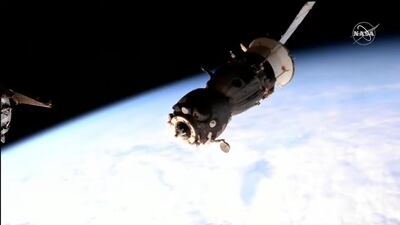A damaged Russian Soyuz spacecraft undocked from the International Space Station on Tuesday and is making its way back to Earth.
The Soyuz MS-22 suffered a coolant leak in December while it was docked to the station, after reportedly being struck by a meteoroid, which left a tiny hole in the spaceship.
A Nasa live stream showed the uncrewed spacecraft separating from the ISS at 1.57pm, UAE time. The space agency will not broadcast the re-entry into Earth and the parachute-assisted landing attempt in Kazakhstan at 3.45pm.
It was feared that the three astronauts — two Russians and one American — who had arrived on the ship in September would be stranded on the station, but Russia's space agency Roscosmos sent a replacement craft, the Soyuz MS-23, last month.
“The leak was first detected on December 14 when pressure sensors in the spacecraft’s cooling loop showed low readings,” Nasa said.
“At the time of the leak, Roscosmos cosmonauts were preparing to conduct a spacewalk. The spacewalk was postponed, so no crew members exited the space station or were exposed to the leaking coolant.”
The incident means that the three astronauts will have completed a year on the station when they return on the replacement ship on September 27.
Russian cosmonauts Oleg Kononenko and Nikolai Chub, as well as Nasa astronaut Loral O'Hara, were meant to use the Soyuz MS-23 for their ISS mission, but they are no longer going.
The coolant system is responsible for lowering temperatures inside the craft during its re-entry through Earth's atmosphere.
A coolant leak means that the spacecraft could experience unstable temperatures during its flight back.
It would have been too dangerous to bring the crew back on the damaged ship.
A second Russian spacecraft, the Progress cargo 82 ship, also suffered a coolant leak in February.
“The reason for the loss of coolant in the Progress 82 spacecraft is being investigated,” Roscosmos said at the time.
“The crew, which was informed of the cooling loop leak, is in no danger and continuing with normal space station operations.”
The resupply spacecraft had arrived on the station in October to deliver food, experiments and personal items to the astronauts.
It safely departed the ISS in February.


